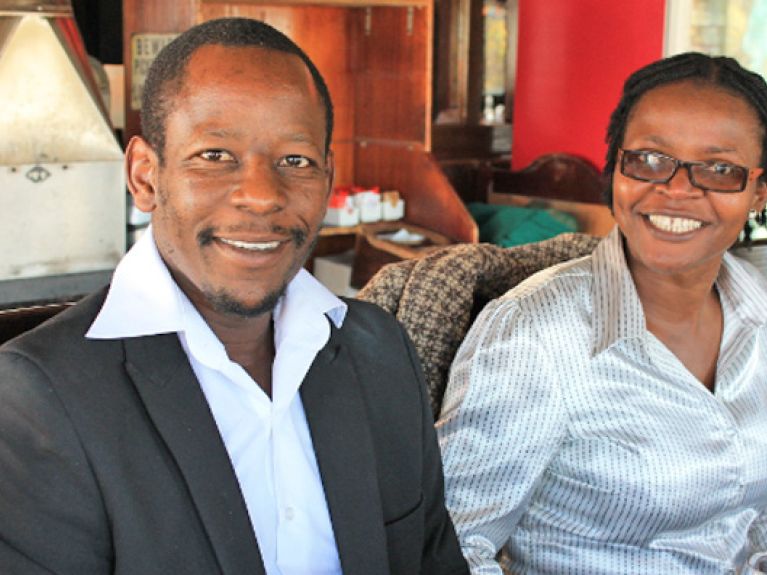Afrika Kommt “opens doors”
Experience, growth, opportunity. Afrika Kommt offers abundant opportunities to it participants. The GIC Africa caught up with recent alumni of this business and professional exchange program.

Schott AG, Continental AG , Deutsche Bahn AG and Volkswagen AG – these are just a few of the big German firms that hosted 20 up-and-coming African businessmen and women for the year-long Afrika Kommt exchange program. The GIC Africa had the pleasure of speaking with alumni of Afrika Kommt. Their experiences were varied but the vote was unanimous – “Afrika Kommt was worth it”, in every sense of the word.
Don Rukanda of Zimbabwe says by joining the program, you have to accept your career will be disrupted and that reintegration can be difficult, but ultimately the experience is invaluable.
“The program helps you better understand how these companies work, the unspoken etiquette or 'Rules of Engagement'. You become more clued up on these aspects.”
And the opportunities come knocking. Don interned at Continental and upon returning to Africa is now working for them. Precious Mashambanhaka, also from Zimbabwe was posted at the Deutsche Bahn during her tenure in the program and now works in their South Africa office. Another participant, South African Precious Radingwana was originally a marketing manager, but upon her return from the program holds a much better position.
And this does not even mention the quiet offers coming in from renowned German firms or from employers now trying to lure these very attractive, trained managers back.
German language as the key
Armed linguistically after an introductory German course at the Goethe Institut in Kenya, these promising young men and women were immersed into German corporations and society at rapid speed. They lived either alone or with families, worked at prominent companies, participated in management seminars and travelled to roughly 10 German cities during their stay.
Speaking German was key to making it all work. Not one of these intrepid intercultural voyagers said it was easy, but they did all agree that the language made things happen for them.
According to Don, “you struggle at the beginning, but once you get comfortable, it opens doors. “ He added comically that bumbling around in the language “shows that your Deutsch is as bad as their English.”
Germans were not quite what I expected
Exchange programs have a fabulous function of exposing people's predispositions, making them confront the false ones and accepting new impressions. The participants found that Germans were more fun than they expected - “my time there shattered the myth of the German as a Duracell battery, working all the time“.
They shared that the image of work only and no interaction was way off. They in fact found many Germans to be fun, interactive, engaged and relaxed.
Precious Radingwana stayed in Wolfsburg while at VW and was surprised that it was a small town. “I thought this big company must be in a big town”. She was warned that Germans take a long time to build close relationships, yet she had a different and positive experience.
Other interesting social dynamics were introduced – forcing them to reconsider notions about their own nations and cultures. Precious Mashambanhaka noted, “When Germans say something, they follow through... and when you come back, you can't help but compare how things work. “
Management and strategy exchange
Inside the companies there were also myths that needed to be dispelled. Don noted “the perception in Germany is that Africa is difficult, especially when trying to push an idea in business.”
Graham Ndanga from South Africa added that “the continent as a whole is ready to do business, and there is demand for good products and services. An unspoken myth abounds in Germany that doing business in most of the continent is not worthwhile. Through the program we were able to shine light into corners of the continent they were yet to explore, and why other companies flourished in such places.
As most of the companies had little to no presence on the continent, they were very appreciative of guidance in areas where they could develop markets, since they almost totally relied upon intelligence collected by outsiders, just like themselves. Having an indigenous point of view really increased their vision.”
Others noted that certain companies did not have a clear Africa Strategy, some had no dedicated person for sub-Saharan Africa, many of the CEOs had never been to Africa and that at headquarters, “not much is expected” from the expatriate Germans in Africa. The participants contributed by impressing upon these business leaders that there is still a lot of potential in Africa. They shared information, giving them the specialized insight into the market.
And the specialized expertise extended to the social arena, where the participants offered human-to-human information and explained cultural norms.
“The cultural education was especially important [for our German host companies] when hosting delegations from Africa, and we found there was much greater mutual respect and comfort because of our facilitating intercultural understanding,” noted Graham.
The good, the bad and the homesick
The program is managed and executed by the Gesellschaft für internationale Zusammenarbeit, or GIZ, and an important component was allowing the participants to get out and explore Germany. The group travelled, had numerous cultural seminars (such as at the Zeit Stiftung), visited the President's residence and attended numerous management seminars.
This took them to at least 10 cities in Germany, including Stuttgart, Hamburg, Frankfurt, Bonn, Cologne and Berlin.
This might sound all good, but there were some hard times: “I missed my family“, “German food is not as tasty as African food”, “It stayed light so long in the evenings that I couldn't sleep”. “Easter and Christmas were so different”.
They left with some fantastic memories. When asked what is the best thing about Germany they all noted with awe the transport system and the fact that “things just work”. Precious Radingwana couldn't help but praise the wonder of “Mülltrennung” - the separation of garbage for recycling.
And no matter how hard it is, they are all keeping up their German.
Afrika Kommt is about to begin its next program 2014-2016
About Afrika Kommt!
Germany’s industry and business leaders have long recognised Africa's potential and the possibilities for further economic cooperation. In 2008, they joined forces and began the programme, which is organised by the German development cooperation organisation GIZ. It is further supported by the Ebelin and Gerd Bucerius ZEIT Foundation and the Robert Bosch Foundation.
The first exchange took place in 2008-2009 and sent 20 people, from Kenya, Tanzania, Ghana, Rwanda, Uganda, Zambia, Zimbabwe, Ivory Coast and Namibia to Germany for a year. In the second course, 2011-2012, 17 participants were selected. The next round took place in 2013-2015.
The fourth session has just completed intake of applications. It runs 2014-2016.
